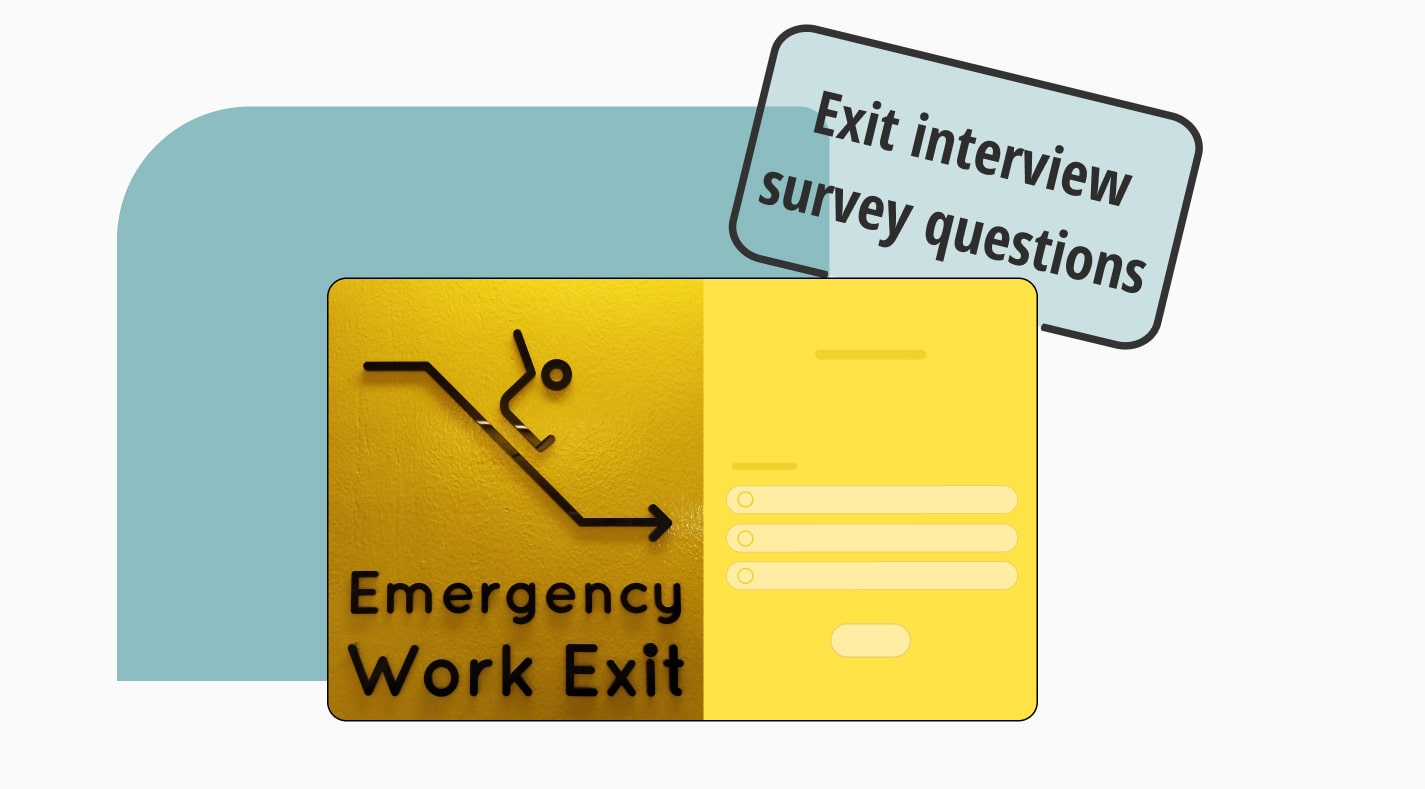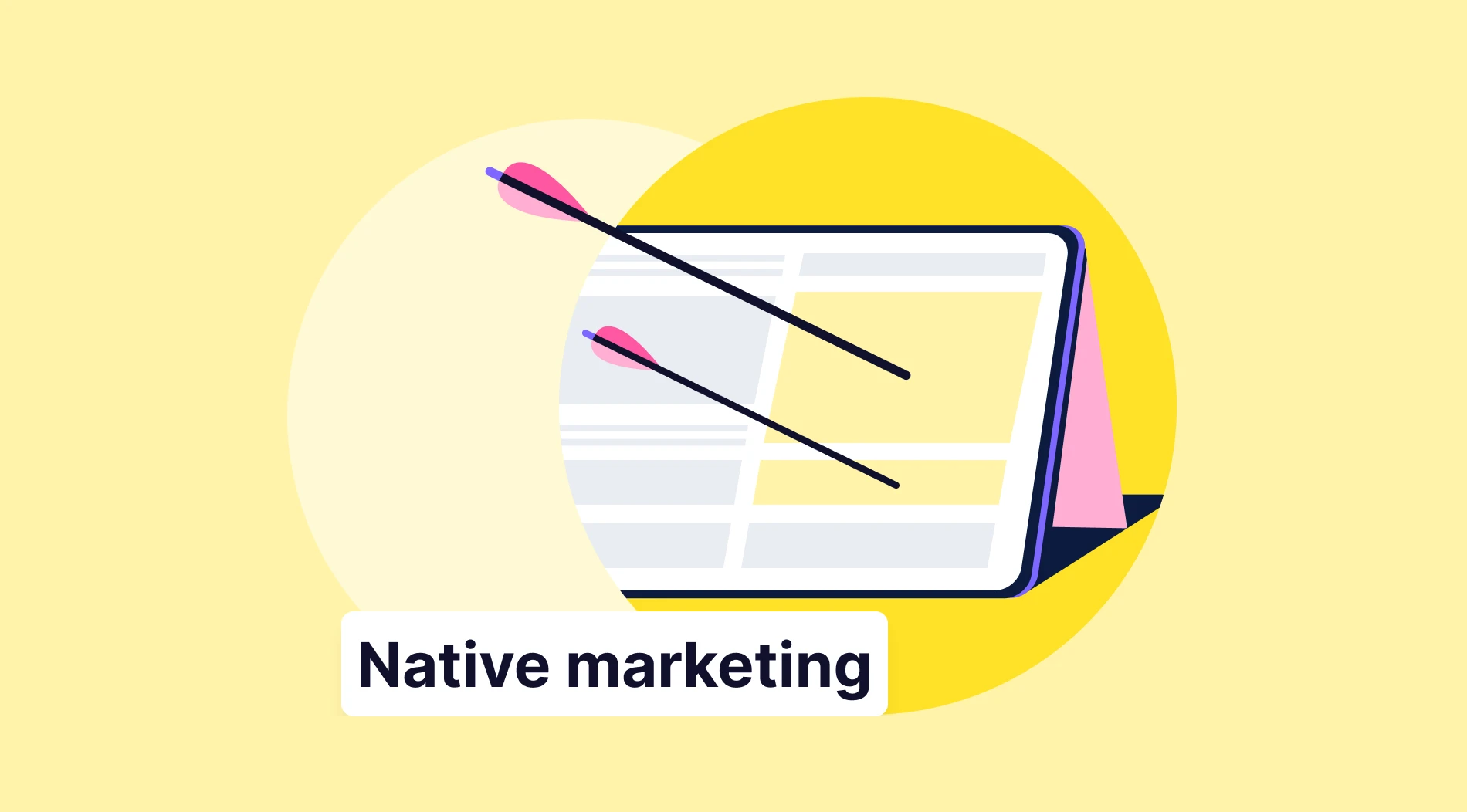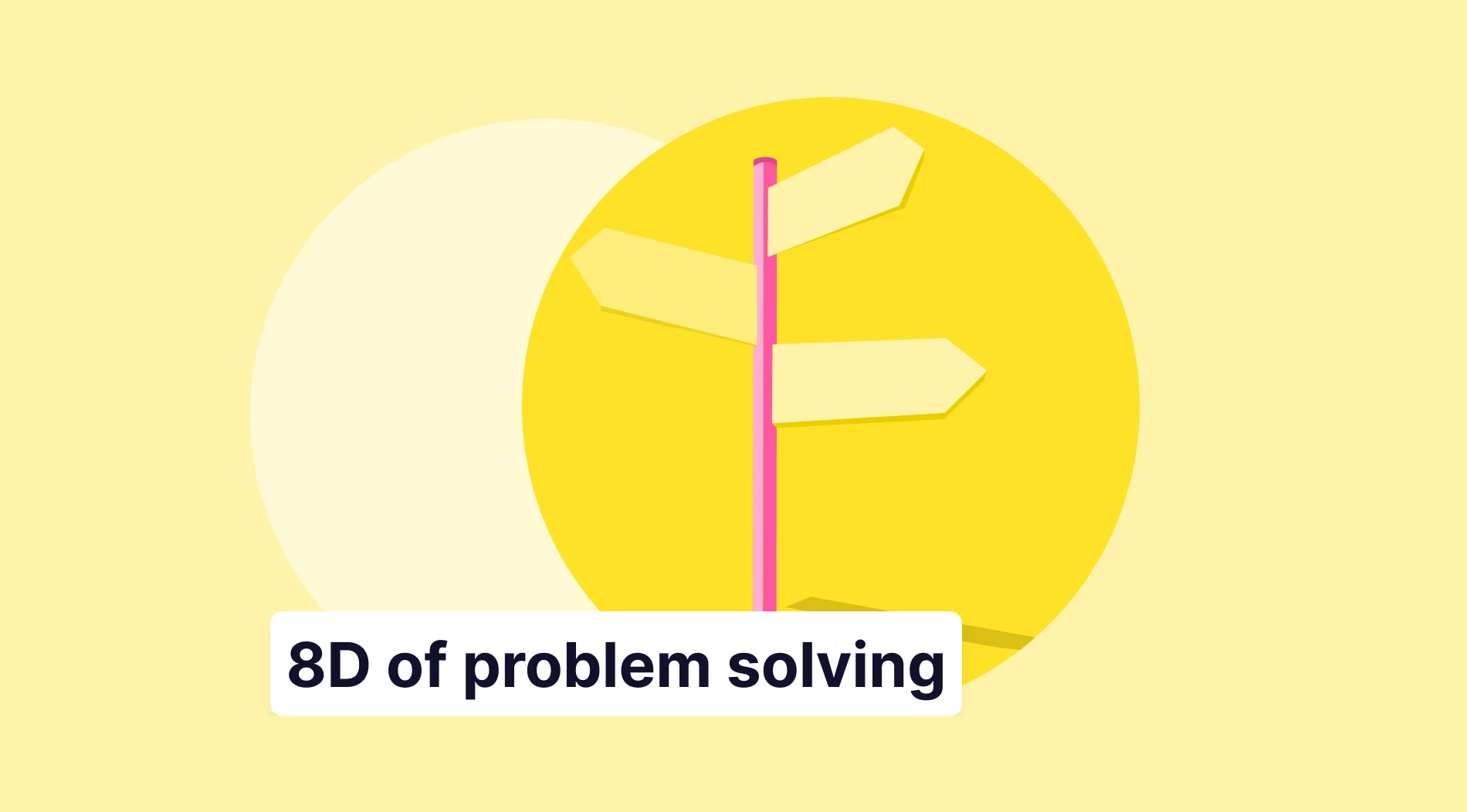Understanding the employee offboarding process is crucial for company progress. Departures provide a unique perspective and opportunity to gather information. Practical exit interview surveys are a powerful tool in this context.
This article features a thoughtfully curated list of over 20 high-quality exit interview survey questions created to optimize this crucial process. Adopting these questions can help businesses revolutionize their internal procedures, improve employee engagement, and pave the way for a more future-oriented human resources department.
What is an exit interview survey?
An exit interview survey is a systematic and reflective feedback method between a company and a departing employee who decided to leave, similar to a goodbye talk but for employee feedback. We can say that it is a bridge between the past and the future. Exit surveys are an excellent tool for organizations to gather information.
Both parties can obtain a better knowledge of the situation and collaborate to achieve a smooth transition for the departing employee and a more favorable work environment for those who remain as a result of this procedure. These surveys have particular advantages, such as tapping into departing employees' invisible experience for seamless knowledge transfer, stimulating inventive ideas from fresh viewpoints, and so forth.
20+ question examples to ask in your exit interview survey
Engaging in an exit interview journey is equivalent to unlocking a treasure mine of insights and observations. This compilation of 20+ expertly prepared employee exit survey questions tries to search into this body of information.
1. What is the primary reason for leaving the company? (Single selection)
a) Job dissatisfaction
b) Seeking new adventures
c) Private reasons
d) Salary issues
e) Other
2. What accomplishment or contribution are you most proud of during your time here? (Long text)
3. How would you rate the development opportunities within the company? (Star rating)
4. In retrospect, what recommendations would you provide to your successor or future employees? (Long text)
5. Can you describe a moment or experience that significantly impacted your professional growth? (Long text)
6. Were there any moments when you felt disconnected from work? (Yes/No)
7. Assume you're designing a new wing for our office. What kind of theme element would you include? (Short text)
8. What initially attracted you to join our company? (Multiple selection)
a) Company’s reputation
b) Flexible work hours
c) Sources for improvement
d) Company values
e) Other
9. In your opinion, what sets our organization apart from others? (Single selection)
a) Collaboration partners
b) Powerful company culture
c) Value provided to employees
d) Continuous progress
e) Other
10. What would you call your entire experience here if you were to coin a phrase? (Short text)
11. What would the show's catchy theme tune be if your experience here was a sitcom? (Single selection)
a) “I Will Survive” by Gloria Gaynor
b) “Happy” by Pharrell Williams
c) “That’s Life” by Frank Sinatra
d) “Boulevard of Broken Dreams” by Green Day
e) None of the above
12. How would your job description appear if it had been recreated entirely in emojis? (Short text)
13. What reasons affected your decision to leave and pursue new chances outside of our company? (Multiple selection)
a) Better location option
b) Opportunity to work remotely
c) Personal goals
d) Ethical problems
e) High profits
f) Other
14. On a scale of 1-10, how well do you believe our organization supports a healthy work environment? (Opinion scale)
15. What do you think about the balance of your workload and work-life integration during your time here? (Long text)
16. Were there any times when your work required you to adjust to new technologies? (Yes/No)
17. What, in your opinion, is the importance of competent leadership in sustaining a positive and productive work environment? (Single selection)
a) Motivation
b) Talent
c) Adaptability
d) Employee turnover
e) Other
18. Could you please provide detailed insights into the effectiveness of team dynamics? (Long text)
19. Does the company support and value employee voice? (Yes/No)
20. How effective were our organization's communication strategies and channels for you? (Star rating)
21. Can you please share your honest feedback (with both positive and negative ones) with us? (Long text)
How to create your own exit interview survey (free templates)
Now, you may wonder how these surveys for employees leaving will be prepared. Your answers are included in this section. There are various online survey tools for surveys that you may know. This guide will walk you through creating your own exit interview survey on forms.app.
forms.app is a survey tool that provides easy tools to help create, distribute, and analyze your exit interview survey. It has various free survey templates and features such as:
- Conditional logic
- Auto-scoring (The Calculator)
- AI form and survey generation
- Third-party integrations & more.
Here are all the steps to help you create a complete and valuable exit interview survey:
- Step 1: First of all, sign in or create a forms.app account for free.
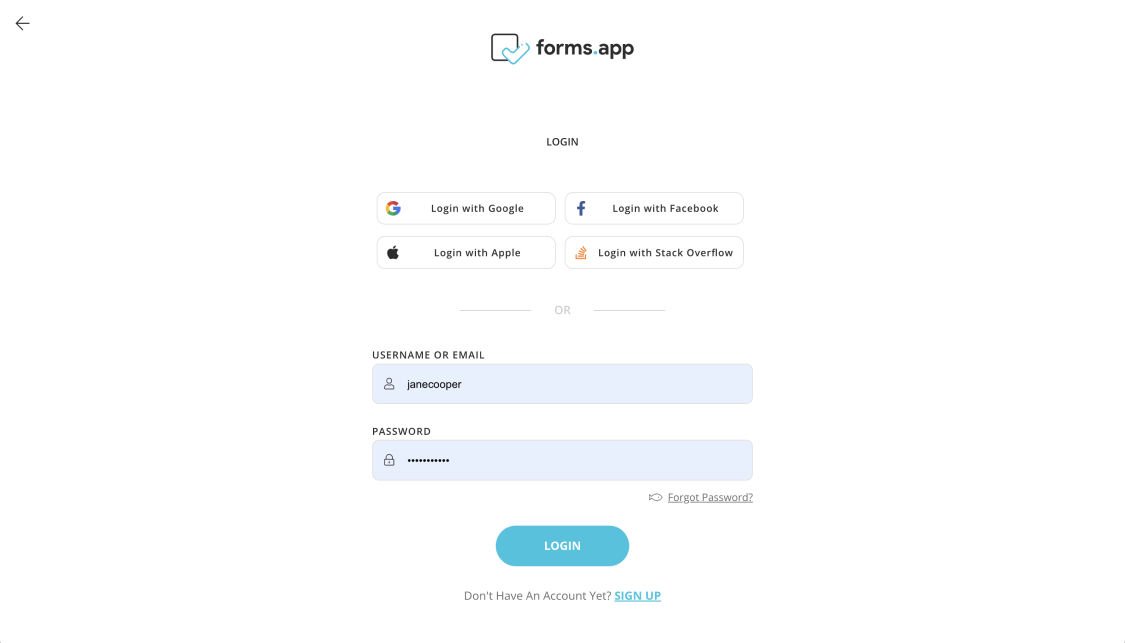
Sign in or create an account for free
- Step 2: After logging in, select “Create Form”.
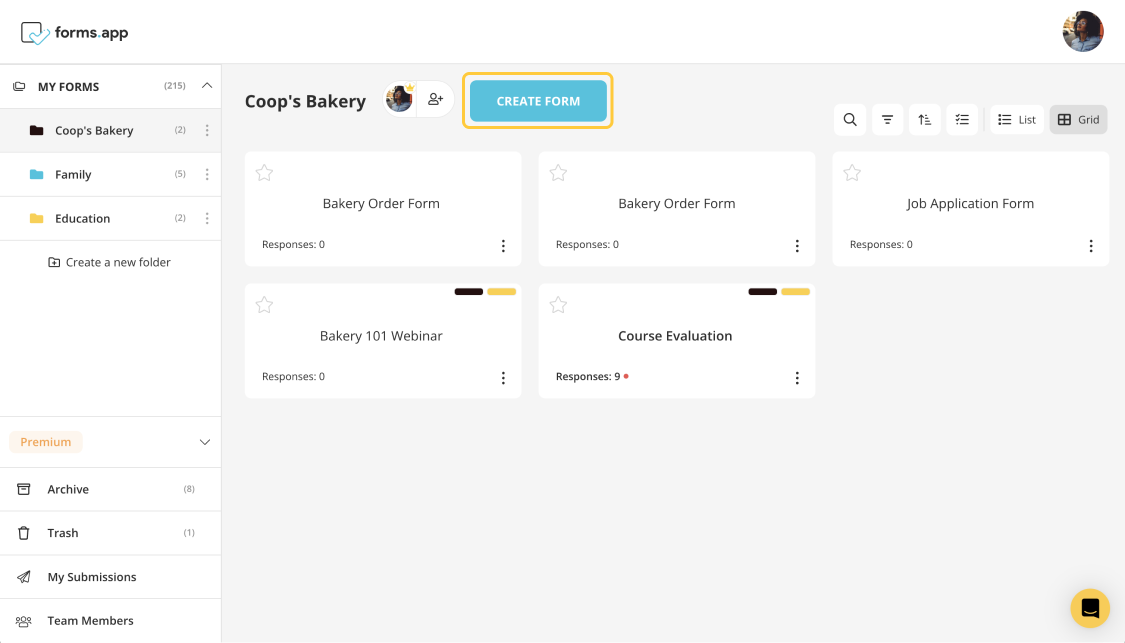
Create a form
- Step 3: Alternatively, you can start with this employee exit interview survey sample on forms.app. With ready-made designs and questions, this exit interview survey template can help you save time. Alternatively, you can start from scratch or use forms.app AI for creating your survey.
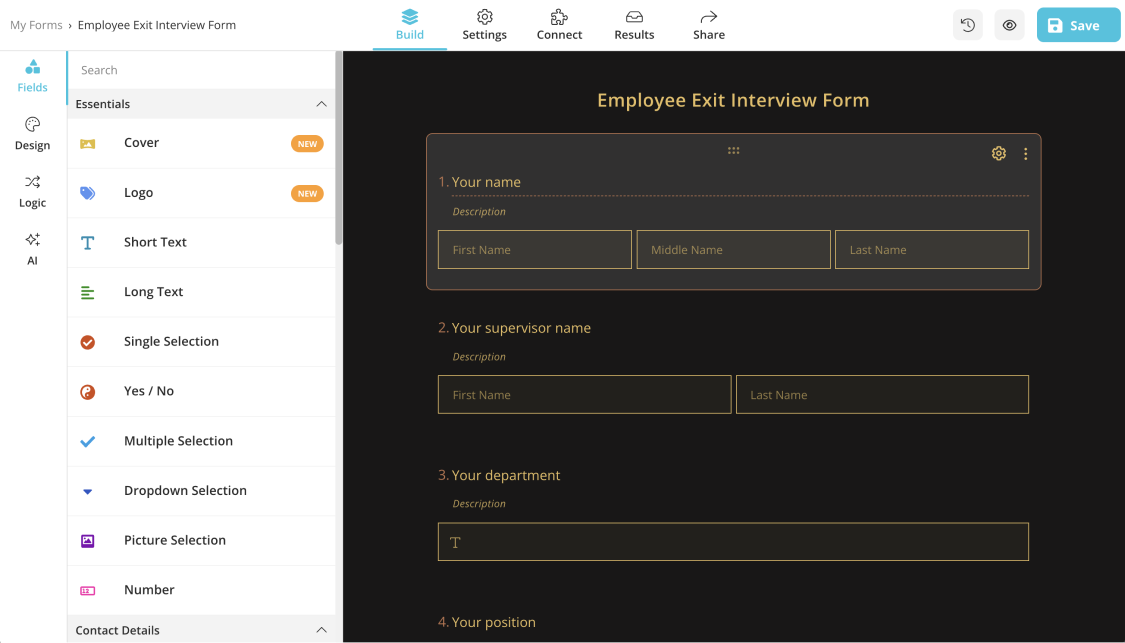
Or select a template
- Step 4: After opening your survey template, just drag & drop one of the question fields on the left side of the page to where you want it.
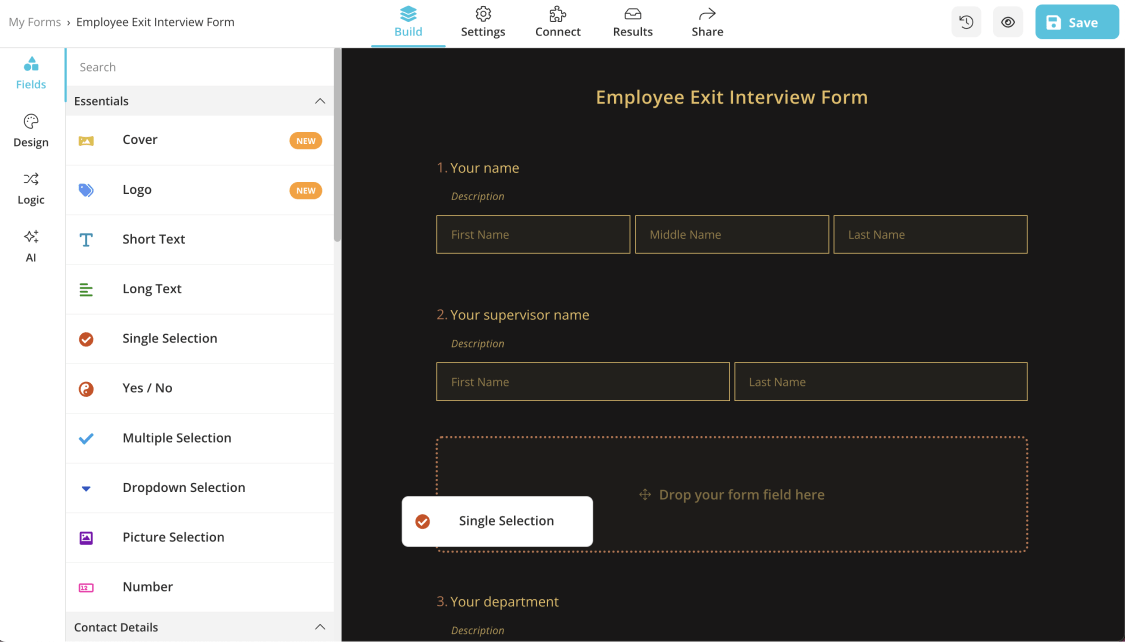
Add your own questions
- Step 5: Change the customization options and modify how your form looks.
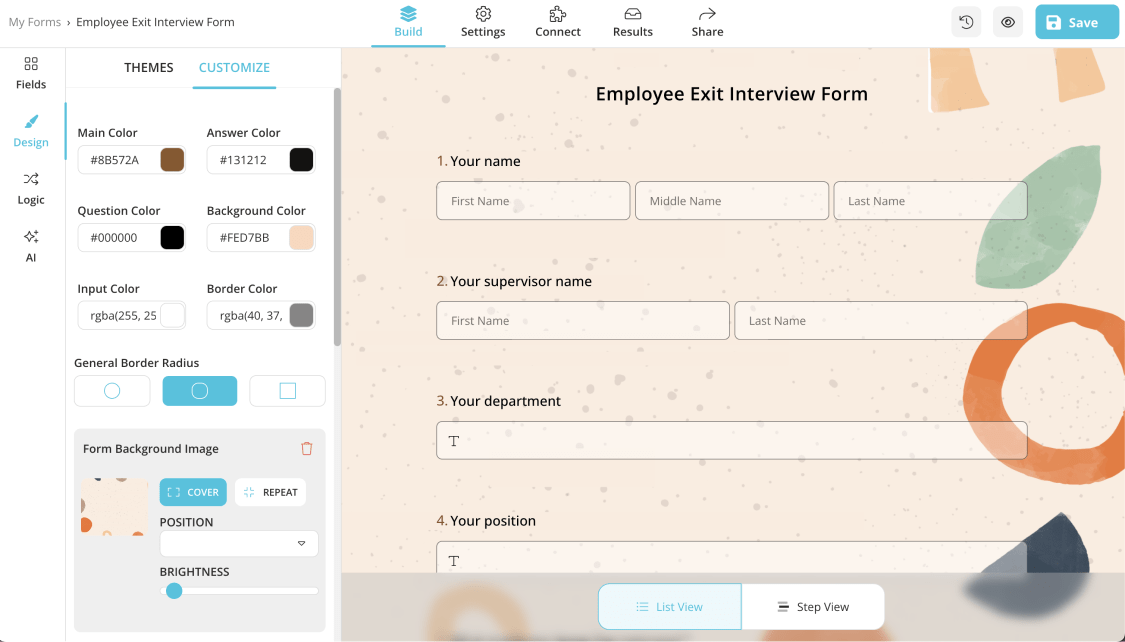
Change how your form looks
- Step 6: Share your survey after you are through or simply embed it on a specific web page.
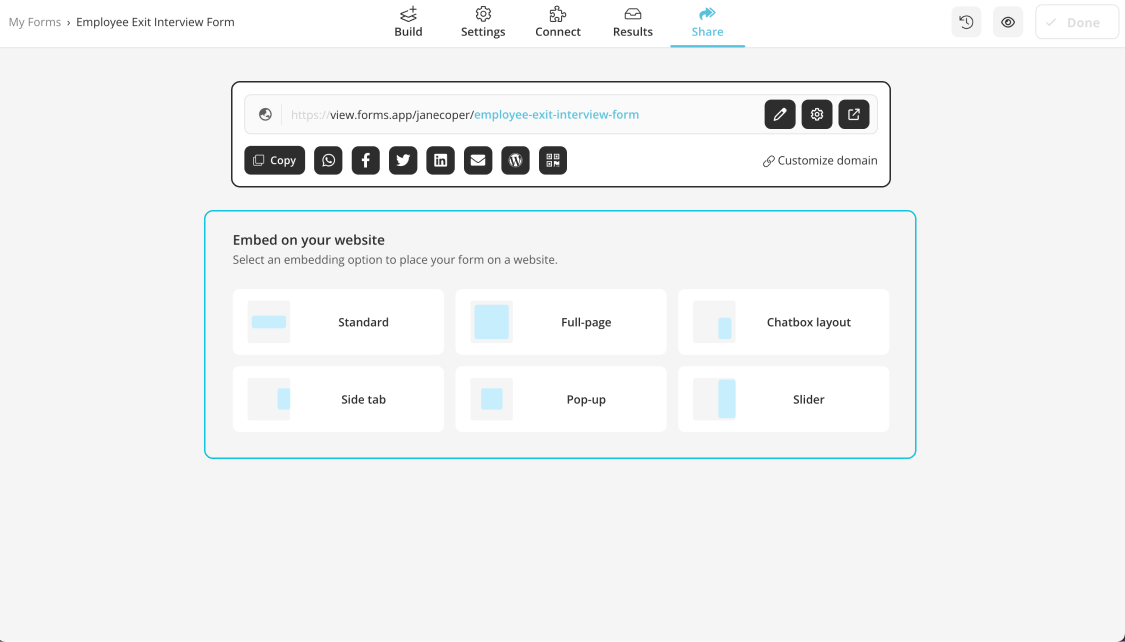
Share your exit interview survey
We have mentioned the 6 easy steps to follow when creating an exit survey. As you can see, this is a simple and quick process leading to gathering valuable data. Businesses can gain valuable insights by engaging departing employees through exit interview questionnaires.
3 Tips for creating a better exit interview survey
We stressed the importance of developing an efficient and insightful exit interview checklist for departing staff. With special and comprehensive guidance, your departure interview survey can develop into a potent instrument for pinpointing areas that want development. Here are some tips for conducting an exit survey:
1. Address job roles: Add specific conditions to the questions to reflect particular departments or job positions. This method enables a more profound comprehension and captures role-specific insights.
2. Diversify question fields: Use a combination of scaled, multiple-choice, and open-ended questions. This range of options invites participants to offer both quantitative and qualitative input, facilitating a more thorough study.
3. Order chronologically: Organize your survey questions chronologically so they reflect the path an employee takes while working for the company. Survey takers are encouraged to think back on their entire journey while exploring ideas from various stages by following the chronological flow.
4. End things positively: No matter the reason, it is always best to end things in a positive way when saying goodbye to a colleague. Make sure to let them know you appreciate their efforts and the time they spent on the thank-you page.
To sum up
The blog article provides instructions on utilizing forms.app, a user-friendly survey tool, to create an exit interview survey. The step-by-step procedure makes creating, distributing, and analyzing the survey easier, resulting in valuable data collection and tangible improvements. Also, tailoring questions to job departments, diversifying question types, and arranging them chronologically is vital for an effective exit interview survey.
By implementing these tactics, businesses can use employee satisfaction and exit interview surveys to improve their company culture. You can try the forms to improve your business. So, why do you wait? Begin using forms.app right now to increase your company’s overall performance and understand how employees feel.
Ayşegül is a content writer at forms.app and a full-time translation project manager. She enjoys scrapbooking, reading, and traveling. With expertise in survey questions and survey types, she brings a versatile skill set to her endeavors.
